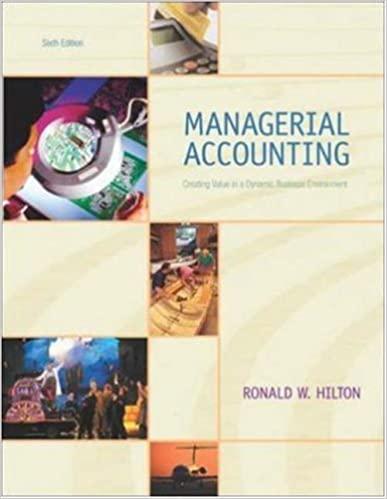Question
You are an internal auditor employed by Airwolf Limited. The core business of Airwolf Limited is the manufacturing and repairing of fighter aircraft, small passenger
You are an internal auditor employed by Airwolf Limited. The core business of Airwolf Limited is the manufacturing and repairing of fighter aircraft, small passenger planes and helicopters. The companys clients are the South African Air Force and other small airline companies. Past poor economic conditions have had a very negative impact on the sales of aircraft and helicopters. This has forced Airwolf Limited to drastically decrease the prices of their aircraft. The rationalisation of the South African Air Force has also negatively impacted the industry. The repairs of all aircraft and helicopters, however, remain very profitable. One of the most important processes related to the repairs of the aircraft, is the procurement of the right spares at the right quantity, price and quality at the right time.
You are busy planning the audit engagement of the acquisition and expenditure business process/cycle and have already completed a walk-through test to obtain an understanding of the processes.
You documented the acquisition of spares as follows: Acquisition system spares
- Approximately 70% of the spares are imported from the United States of America (USA) and Germany and the rest from local suppliers.
- The computer provides a daily printout of all inventory items that have dropped below the minimum inventory levels.
- The chief store manager, Mr Nkosinathi, issues requisitions for the items that appear on the above printout. These pre-numbered requisitions are then sent through to the purchase department where the chief buyer, Ms Tuge, approves each requisition and completes an order for each. The order gets the same number as the requisition.
- Goods that are imported from Germany sometimes take as long as 90 days from the order date to arrive at Airwolf Limited. To save time, Mr Nkosinathi sometimes authorises the requisitions himself and issues order forms for spares that are imported from Germany.
- Contracts, which are negotiated at the beginning of the year, exist for all spares imported.
- Local spares are purchased from the supplier identified as being the cheapest at the beginning of the year. For the next two years, orders will then be placed with this supplier.
- As soon as the spares are received, Mr Nkosinathi compares them against the order to ensure that the correct quantities and items have been delivered. If he is satisfied, he issues a goods received note (GRN) for the items and signs it. The inventory items are then locked up in a receiving store and the inventory records are updated.
- If certain spares must be returned to the supplier, Mr Nkosinathi notes this in his diary only.
- As soon as the suppliers invoice is received, Miss Putter, the creditors clerk, compares the invoice to the order form and the GRN to ensure that the invoice is correct regarding quantity, type, price and calculations. She initials the invoice if she is satisfied. She then files it in alphabetical order, together with the relevant order and GRN.
- Miss Putter also maintains a list of goods received for which no invoice has been received yet. She phones the suppliers weekly to enquire about the outstanding invoices.
- It is Miss Putters duty to maintain the purchasing journal, creditors ledger, and creditors control accounts. At the end of every day she updates the purchasing journal with the invoices received for the day.
- As soon as she receives the creditors statements from the suppliers at the end of the month, she compares the statements with the individual creditors accounts. If she is satisfied that they are correct, she prepares an electronic fund transfer (EFT) requisition for each statement and sends them, together with all the accompanying documents, to Mr Johannes, one of the accountants.
- Mr Johannes then goes through all the supporting documentation and approves the EFT requisitions and captures the EFT payments on the banking system. Mr Johannes and Mr Osman, the chief accountant, provide the final approval of EFT payments on the banking system by each entering a password. The authorised EFT requisitions are then sent back to Ms Putter who files it at the end of the week.
- It is Mr Johanness duty to supervise the acquisition system and to ensure that it functions as described.
REQUIRED
| 1.1 | Identify and list six (6) strengths of the acquisition and expenditure cycle described above. | (6) |
| 1.2 | Describe eight (8) weaknesses in the above system. | (12) |
| 1.3 | For each of the weaknesses described above, compile appropriate recommendations to improve the identified weaknesses. | (8) |
Please use the following format for your answer in 1.2 and 1.3:
| 1.2) Weakness | 1.3) Recommendation |
Step by Step Solution
There are 3 Steps involved in it
Step: 1

Get Instant Access to Expert-Tailored Solutions
See step-by-step solutions with expert insights and AI powered tools for academic success
Step: 2

Step: 3

Ace Your Homework with AI
Get the answers you need in no time with our AI-driven, step-by-step assistance
Get Started


